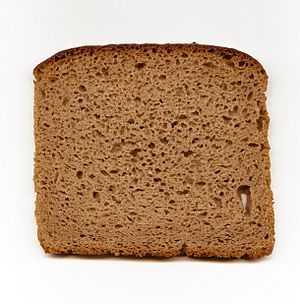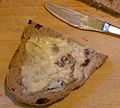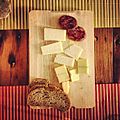Brown bread facts for kids
Brown bread is a type of bread that gets its name from its color. It's usually made with lots of whole grain flour, often from rye or wheat. Sometimes, special dark ingredients like molasses (a thick, sweet syrup) or coffee are added to make it even darker and give it a unique taste. This bread is a popular choice for many people because it's often packed with nutrients.
Contents
What Makes Brown Bread Brown?
Brown bread gets its color and special texture from the type of flour used. Unlike white bread, which is made from refined flour, brown bread uses whole grain flour.
Whole Grains vs. Refined Grains
When grains like wheat or rye are processed, they have three main parts:
- Bran: This is the outer layer. It's full of fiber, which is great for your digestion.
- Germ: This is the part that could sprout into a new plant. It has healthy fats, vitamins, and minerals.
- Endosperm: This is the starchy middle part. It provides energy.
For white flour, the bran and germ are removed. This makes the flour very fine and gives white bread a soft texture. But it also removes many important nutrients.
For whole grain flour, all three parts of the grain are kept. This means brown bread has more fiber, vitamins, and minerals than white bread. Keeping these parts also gives brown bread its darker color and often a chewier texture.
Special Dark Ingredients
Sometimes, brown bread gets its color from other ingredients, not just whole grains.
- Molasses: This is a thick, dark syrup made from sugar cane or sugar beets. It adds a deep, sweet flavor and a rich brown color.
- Coffee: A small amount of coffee can be added to the dough. This gives the bread a darker color and a subtle, earthy taste.
- Caramel Coloring: Some breads might use caramel coloring to make them look browner, even if they don't have a lot of whole grains.
Different Kinds of Brown Bread
Brown bread is popular all over the world, and different places have their own unique versions.
Irish Soda Bread
In Ireland, a very popular type of brown bread is Irish soda bread. It's a "quick bread," meaning it doesn't use yeast to rise. Instead, it uses baking soda and buttermilk. The buttermilk reacts with the baking soda to create bubbles, making the bread light and fluffy. Irish soda bread often has a slightly tangy taste and a dense, moist texture. It's usually served with butter or jam.
New England Brown Bread
In the New England region of the United States, there's a traditional brown bread often steamed instead of baked. This gives it a very moist, dense texture, almost like a pudding. It's often made with a mix of flours, including rye and cornmeal, and sweetened with molasses. This bread is sometimes served with baked beans.
Rye Bread
Many types of rye bread are also considered brown bread. Rye flour naturally has a darker color and a strong, earthy flavor. Rye breads can be very dense and are popular in many parts of Europe, especially in Germany and Scandinavia. Some famous rye breads include pumpernickel and sourdough rye.
Why is Brown Bread Good for You?
Eating brown bread can be a healthy choice for several reasons.
Full of Fiber
Because brown bread is made with whole grains, it's packed with dietary fiber. Fiber helps your digestive system work well. It can also help you feel full for longer, which might help you manage your weight. Fiber also helps keep your blood sugar levels steady.
Rich in Nutrients
Whole grains contain many important vitamins and minerals. These include:
- B vitamins: These help your body turn food into energy.
- Iron: Important for healthy blood.
- Magnesium: Helps with muscle and nerve function.
- Zinc: Good for your immune system.
Eating brown bread regularly can help make sure you get enough of these important nutrients.
Good for Your Heart
Studies show that eating whole grains can be good for your heart. The fiber and other nutrients in brown bread can help lower bad cholesterol levels and reduce the risk of heart disease.
How Brown Bread is Made
Making brown bread is similar to making other types of bread, but with some key differences.
Ingredients
The main ingredients are whole grain flour (like wheat or rye), water, salt, and often a leavening agent.
- Yeast: For many brown breads, yeast is used to make the dough rise. Yeast is a tiny living organism that produces gas, creating air pockets in the bread.
- Baking Soda: For quick breads like Irish soda bread, baking soda and an acid (like buttermilk) are used instead of yeast.
Mixing and Kneading
The ingredients are mixed together to form a dough. Then, the dough is often kneaded. Kneading helps to develop the gluten in the flour, which gives the bread its structure and chewiness.
Rising and Baking
After kneading, the dough is left to rise. This is where the yeast (if used) does its work, making the dough bigger and lighter. Once it has risen, the bread is baked in a hot oven. The heat helps the bread to cook through and form a delicious crust.
Images for kids
-
Chocolate-coloured sourdough bread
See also
 In Spanish: Pan integral para niños
In Spanish: Pan integral para niños
 | Audre Lorde |
 | John Berry Meachum |
 | Ferdinand Lee Barnett |








